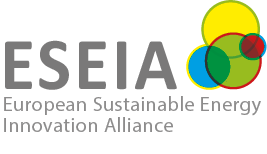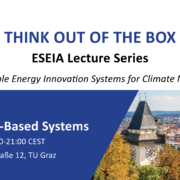ESEIA Lecture Series: Fourth Lecture Delivered by Professor Michael Bongards
Use-reuse-upcycle-recycle? If you are interested in circular economy and novel green technologies, we invite you to join us for the next ESEIA Lecture Series event! Titled Circular Bio-Based Systems: metabolon From Theory to Practice, the lecture will be delivered on 25 May 2023 by Professor Michael Bongards, TH Köln – University of Applied Sciences, Germany.
The fourth lecture in our hybrid lecture series will be held from 19:00 to 21:00 CET at the Auditorium (Aula) of the Graz University of Technology, with live streaming.
During the lecture, the ESEIA Working Group Biorefineries, Biobased Economy and Bioresource Utilization Coordinator Michael Bongards will delve into the future of sustainable living, focusing on the challenges of a circular economy in theory and the integration of novel green technologies in society.
Using the case of :metabolon, he will also give an overview of the main areas of research and innovation, including organic and inorganic waste materials, treatment facilities on a technical scale, and interdisciplinary approach (biotechnology, mechanical and chemical engineering and automation using AI).
The Director of Waste Management of the City of Graz Alexandra Loidl and the CEO of the Umbrella Organisation of Styrian Waste Management Associations Christian Schreyer will join the discussion and share their professional insights highlighting solutions from the point of view of the City of Graz and the Region of Styria, Austria.
The Professor at the Institute of Process and Particle Engineering at TU Graz Michael Narodoslawsky chairs the lecture.
The lecture is free and open to all interested stakeholders.
Meet our guest lecturer
Professor Michael Bongards has been Scientific Director of the Research Institute :metabolon from 2010 to 2020 and is a member of the Institute of Automation and Industrial IT at TH Köln – University of Applied Sciences, Germany. He is the Coordinator of ESEIA Working Group Bioresources, Biobased Economy and Bioresource Utilization. In his scientific work, he focuses on using methods of computational intelligence (CI) to improve simulation systems and to optimize the operation of environmental technology systems, such as sewage treatment plants or biogas plants. Projects’ central topics include waste to value, new technologies for the use of bioenergy, and renewable bioresources.
More information about this and the upcoming events in the ESEIA Lecture Series on Sustainable Energy Innovation Systems for Climate Neutrality is available here.
Contact:
ESEIA Team: office@eseia.eu


